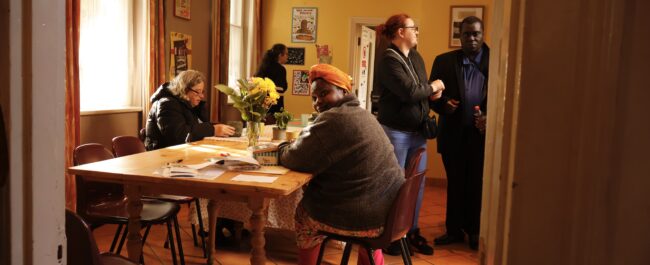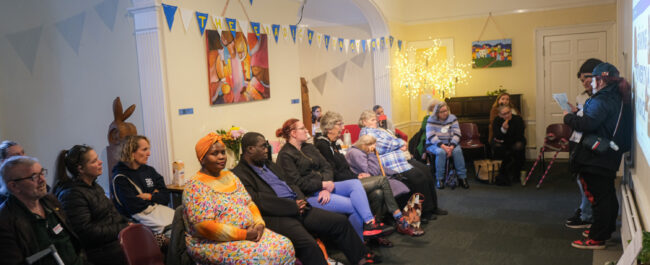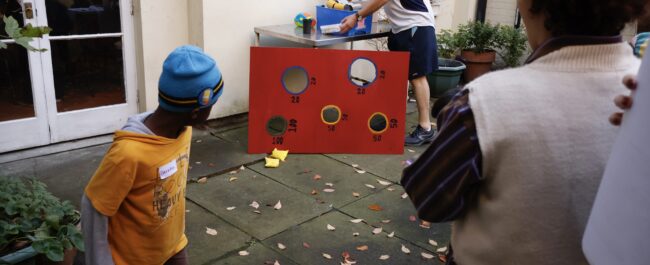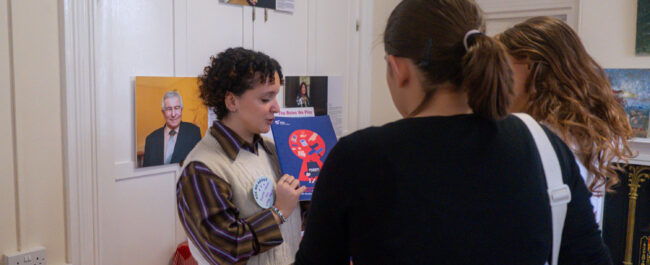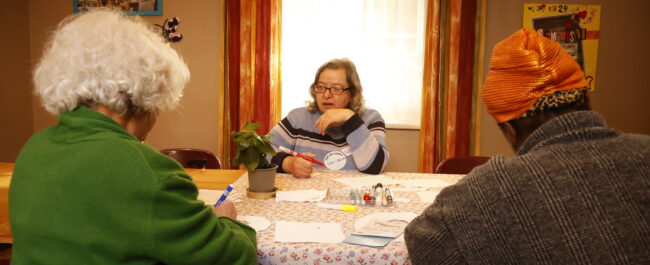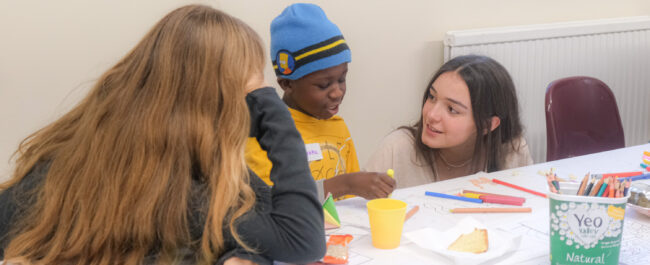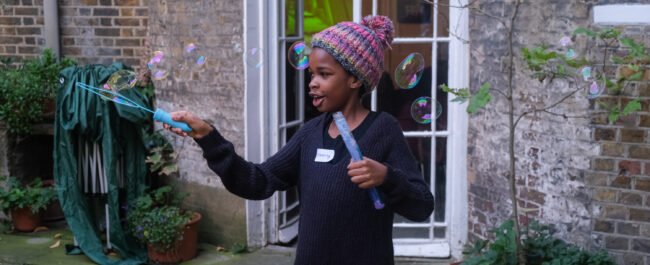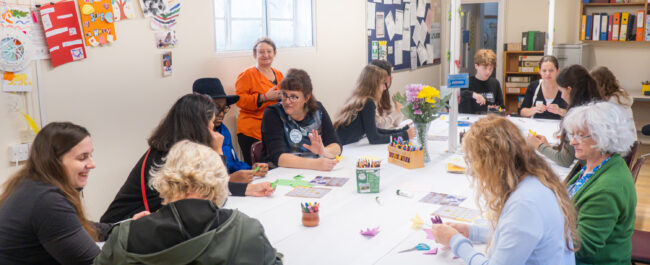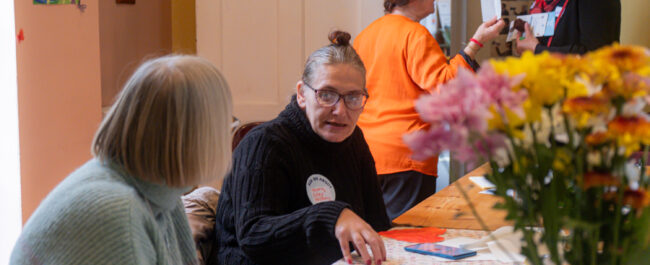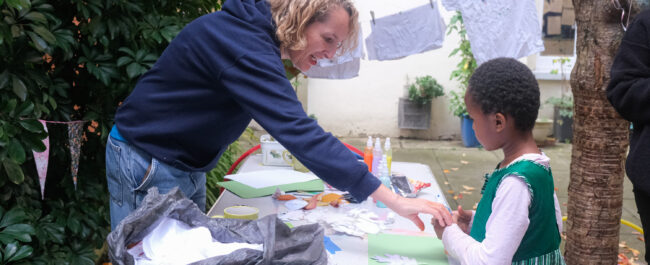Open House for the International Day to End Poverty
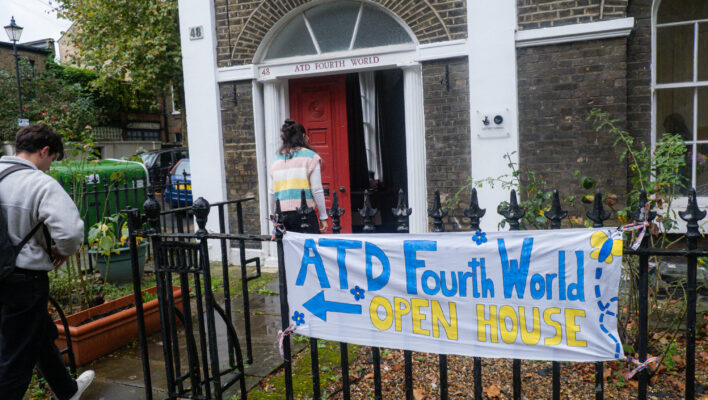
On 19 October 2024, we opened our doors for a day of celebration, remembrance, and connections to mark the International Day to End Poverty. We explored our creativity, listened to poems and speeches written by activists with lived experience of poverty, ate delicious cakes kindly donated by neighbours and friends, and engaged in inspiring conversations with many of you—some who we’ve known for a long time, and some who dropped in spontaneously and are now beginning to discover ATD Fourth World.
Every year around 17 October, we celebrate and amplify the voices of people experiencing poverty. From poetry jams, to plays, to photo exhibitions, and gathering around a meal, people from all walks of life stand together alongside people living in pvoerty.
Click to see some photos of the day:
We had amazing partners at our event. Katherine Hill from 4in10 delivered a speech and helped fund our event, and a team from Burgess Sports ran activities for children in the courtyard.
Aye Aye Win, President of the International Committee for 17 October, joined us virtually all the way from the ATD house in Dakar, Senegal. She explained the significance of the day:
“This day has a very special meaning. For us, the International Day to End Poverty has a founding spirit: that people with lived experiences of poverty are at the front and centre of the commemorations, that their faces are seen, their voices heard, and the knowledge that they bring is valued.”
Celebrating lived experiences
Throughout the day members of ATD spoke about experiences and successes from the past year.
Richard, a member of ATD and also a Lived Experience Advisor at Mencap spoke about his participation in the Together in Dignity programme. He said:
“At ATD, they listen to me, I get my voice heard. It shows I’m taken seriously, and that is important. At the end of the day it’s your story you need to tell, no one else’s.
“ATD team members treat me in a way that’s accessible. They don’t use jargon; they use words that I can understand.
It felt to me that I did not have this support before, and with ATD I can ask when I need help.
“When me and my partner came to do well-being activities at ATD, I felt happy. I met some new people; they never judged me, I felt good about myself and happy. It shows that I can be positive, mix with people, I can be me, I can be just Richard. To me well-being is being yourself.
“At first I was a typical person, saying ‘I won’t do pampering’, but after I’ve done it, it felt calm, and good, and different. Even though I got a bit of stress in my mind, it relaxed me.
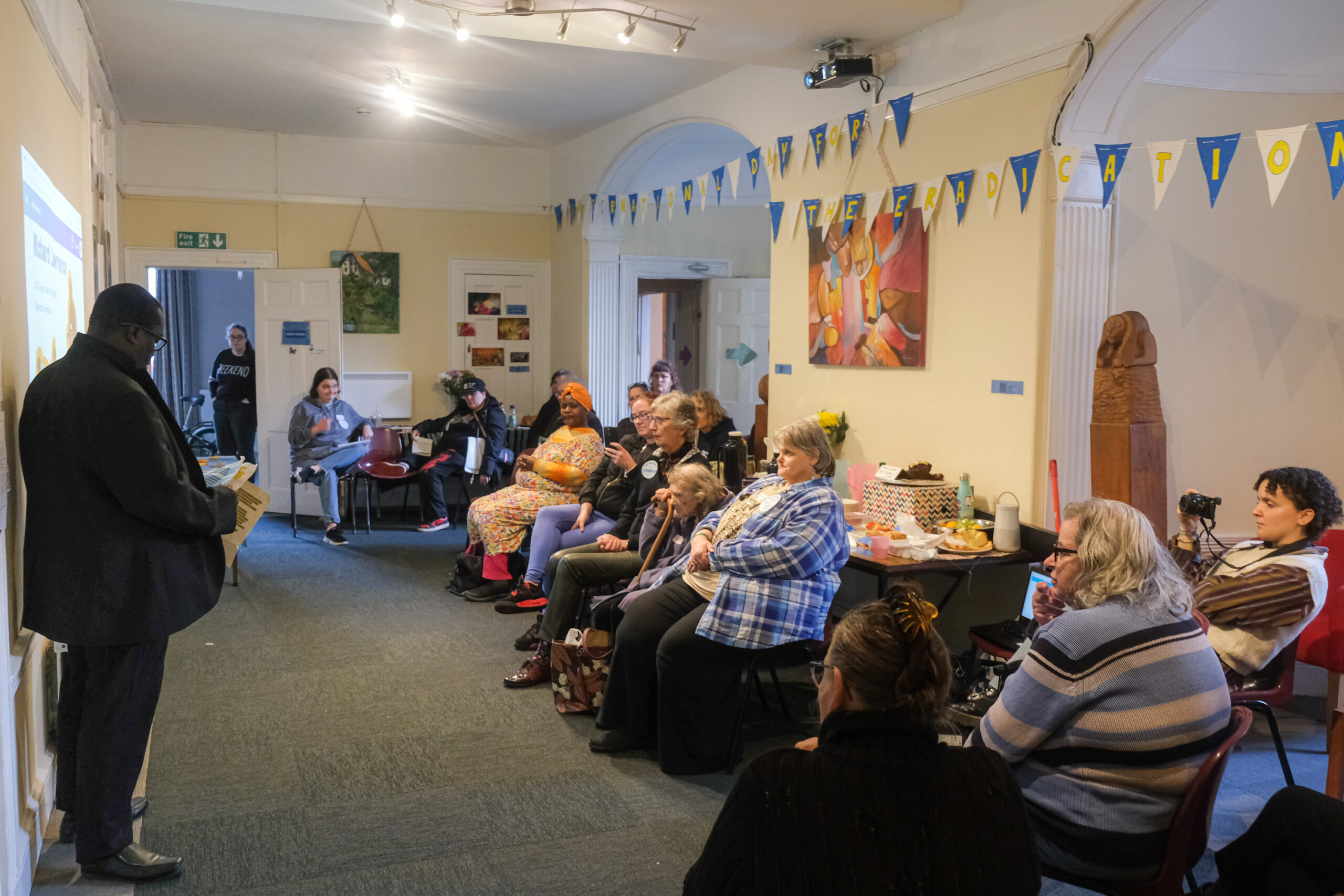
“Well-being is important, it’s about being kind to yourself. It’s easy to help others, but you need to help yourself, that’s important.
“I’m an ambassador for Mencap but I can also be one for ATD, I can speak up and be proud of who I am.”
Then, activists Amanda, Patricia, Lareine and Tammy spoke about the Giving Poverty A Voice programme.
Amanda said: “Last year [during the Understanding Poverty meetings], we prepared for the elections, thinking about the right to vote, the differences between local and national elections, how to register, and what ID to bring.”
For the Poverty Experts projects, activists are invited to speak publicly on different topics. Patricia recounted her experience:
“I was invited to go to Brighton to speak about problems with Universal Credit. It was for an international conference on social protection.
“I really liked that because it makes you feel worthwhile and valued when they listen to what you have to say.”
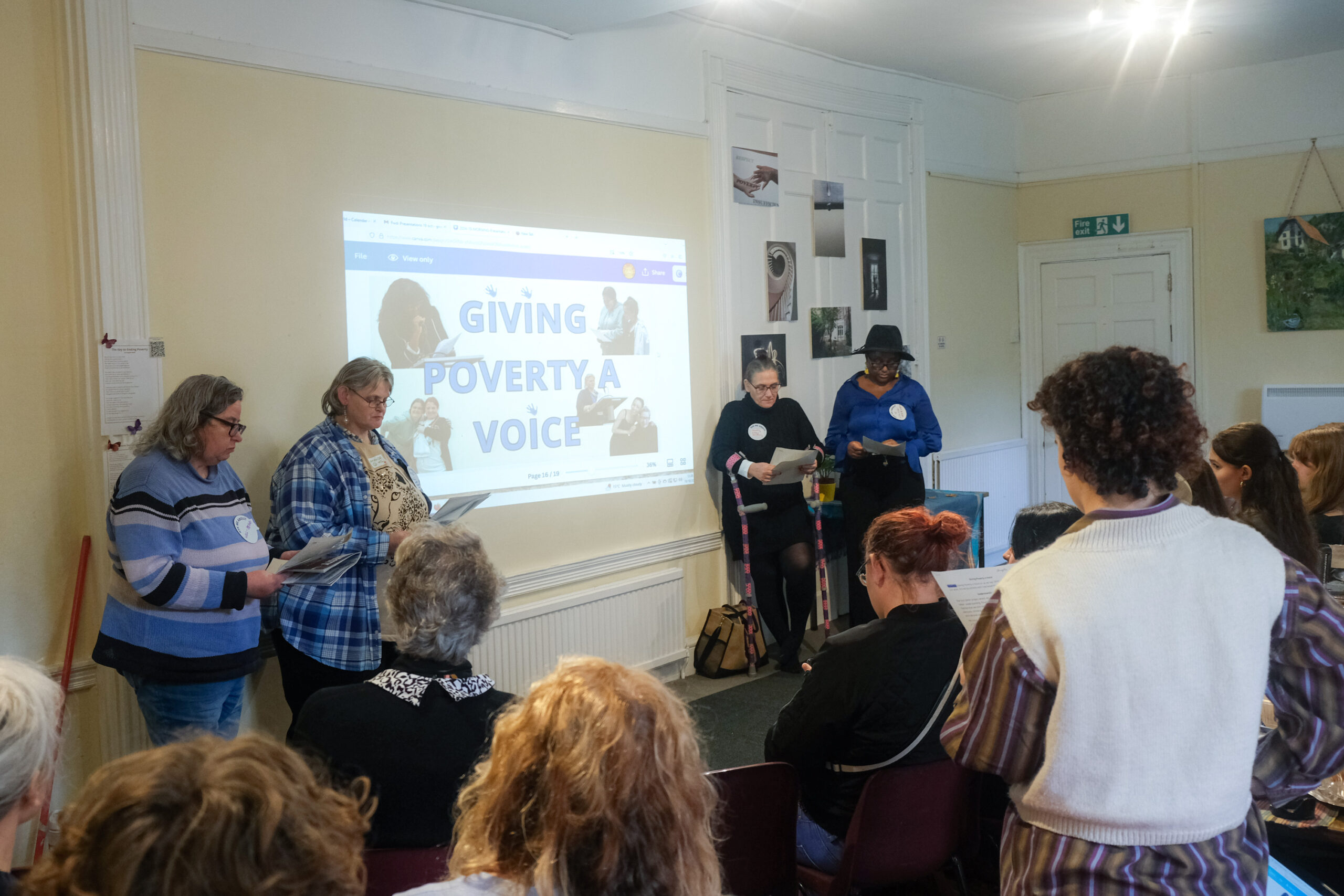
Lareine discussed her experience during a webinar where she was asked to react to an article written by ATD’s team in Tanzania. She says:
“I was really struck that one professor there refused to join an ATD project because he did not think he could discuss poverty with a poor person. We need to open the eyes of people who are born with a golden spoon in their mouth. It is not their fault, but they do not know others’ realities. At the start of the Tanzania project, everyone was bound by fear; but the process made sure that everyone felt valued, and no-one was rejected.
Sitting with others, speaking and being properly heard is very uplifting. It cannot be underestimated.
“By the end of the project, people in poverty became bolder, and academics became more humble. This nurtured something that had been dormant for years.”
Tammy spoke about the Right to Family Life project, and taking part in a European research on Parent Advocacy: “One of the things we found in common in all the countries was that, from generation to generation, we pass on to our children a lot of fear and trauma related to the child protection system. This means that when parents in poverty are struggling, it’s too scary to ask anyone for help. It’s part of what we want to change.”
Poetry readings
The following poems, by Georgina Simmonds and Angela Babb, were read on Saturday.
Behind the Stone Wall
By Georgina Simmonds, writer
All I can wish is that we could find the right person to run the country the way it should be run.
I don’t want to hear “we will cut this, we will cut that” anymore.
I want to hear something new.
Who is the right person? The right person will be someone who can see through the eyes of the world.
And behind that world is the black hole of poverty. The only people who can see it are the ones who live in poverty.
If I were prime minister, I wouldn’t rush into something I would later regret. I would carefully choose my words, I would write with my mind before I write on paper.
What I would like is that everyone is treated equal.
We are all the same, after all. We are all human beings, aren’t we?
The people in poverty are not asking to be the boss; all they’re asking for is to bring their children up in a world without any crime and leave poverty behind.
If only the wind could blow poverty away. Then it would be a new beginning for all and no more dark clouds threatening over them, no more tears. They all could smile again.
If I were prime minister, I would not use the word “poverty”;
I would change it to a new name.
I don’t like that word, it makes you feel like you cannot hold your head up high,
It makes you feel ashamed that you are living this way.
People on the street, people go past and just look down on them.
But some do stop and have a chat and bring a bright ray of light in their dark lonely day.
Every country has got their own poverty, and to me there are three symbols to it. One of these symbols is the war.
The other one is the stone wall. No one can hear their cry, not through the wall of stone.
The third symbol is their tears, just like the rain. They too have tears like you and me.
I cannot go beyond and write something new about the world we live in.
But there is a mystery behind it, it has been going on too long.
If only the wind could get through the echo of poverty.
Who are the ones who can end poverty?
They are the ones who have the eyes that can see through the world. Is it the House of Lords or the House of Commons?
So listen to the people, listen to their views.
Don’t hide behind the stone wall.
We are not shadows, we are human beings, just like you.
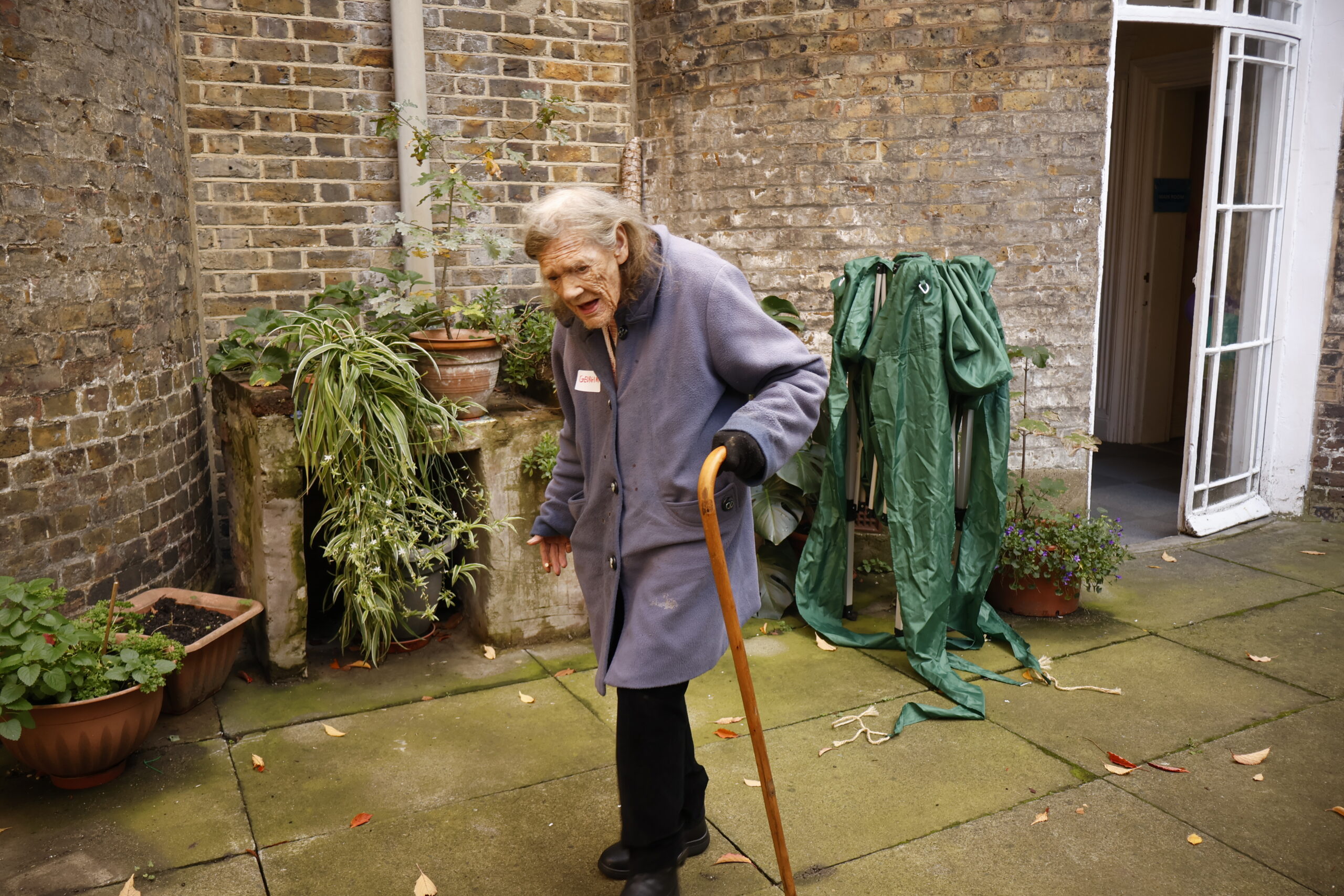
A House That We Called Home
By Angela Babb
When I was sixteen I had no place to go
I packed my things and left home
Everyone said I had the choice
But when you feel like you don’t belong
you have no voice.
“Intentionally homeless”
That’s what people say
But they don’t understand
The reasons for the actions
I had to make.
From our elderly, to our young people
We are trapped
In the cycle
Seen in our streets.
But here I am today
Standing if front of you all
For the 17th
Where my voice can finally be heard
To shed light to this truth
International day to end poverty gives me a space
That I never thought I would have
When I was in my youth.
I will keep on telling my story
And breaking barriers
Until every person has a house
That they can call home.
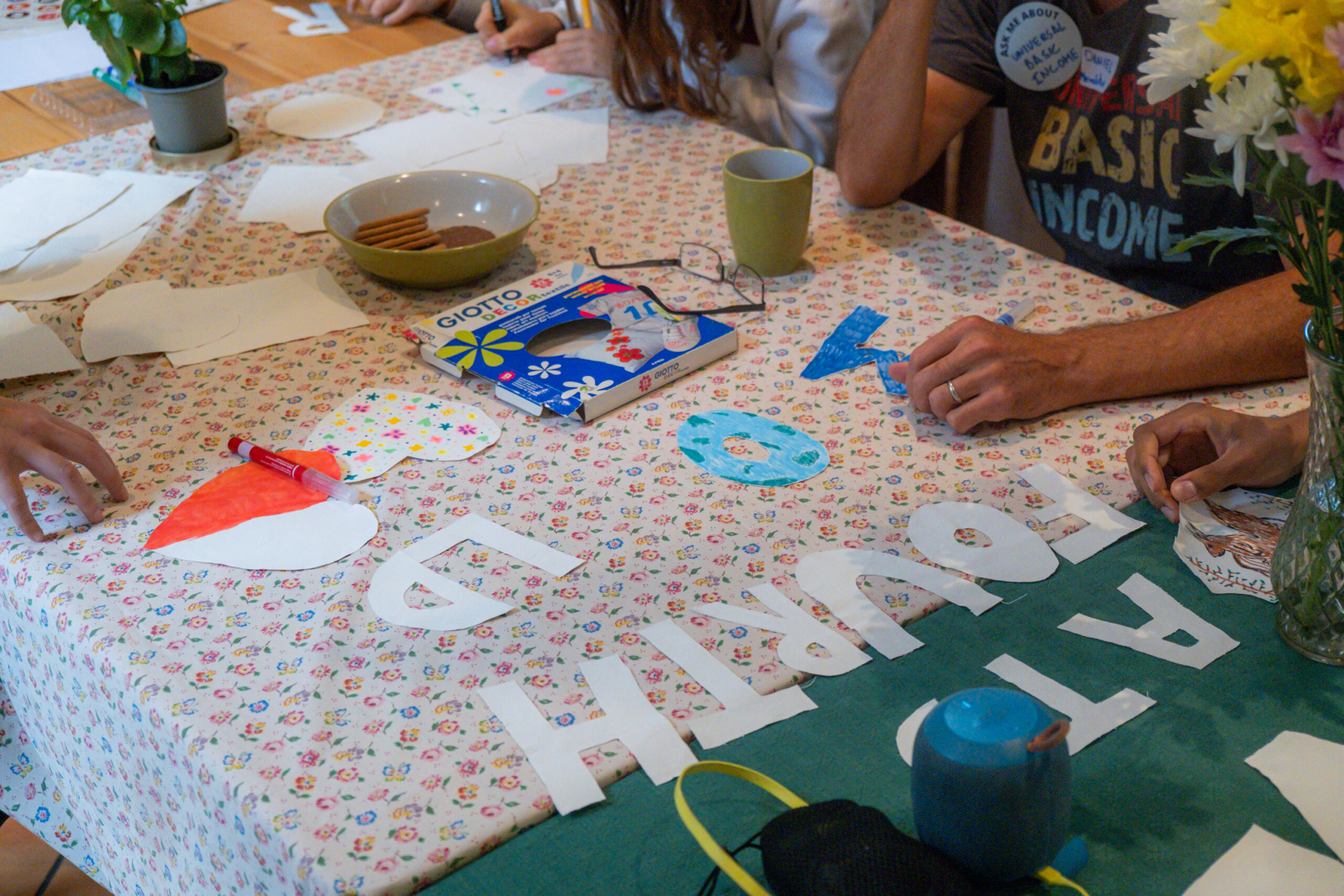
Let me tell you about…
To close the day, attendees were invited to come to the stage and share their thoughts with the audience.
Activists Ruth and Charlotte paid tribute to Barbara Murphy, a long standing member of the ATD community who sadly passed away recently.
They also read Taliah’s letter to the Prime Minister asking the government to include the unique insights of people in poverty in the plan to end poverty for good. Taliah writes:
“Dear Prime Minister, I want to write to you today on the behalf of families in poverty with children who have complex and life limiting disabilities. […] Did you know children’s hospices are charities? Why does the government not believe that families should have support when their children have very short lives?”
This sparked conversations among attendees who shared their experiences and attentively listened to each other.
We finished the day with three amazing songs written by Ruth that made everyone dance!
This event reminds us that many are already involved in the work against poverty. Want to be part of our movement to defend human rights? You can:


